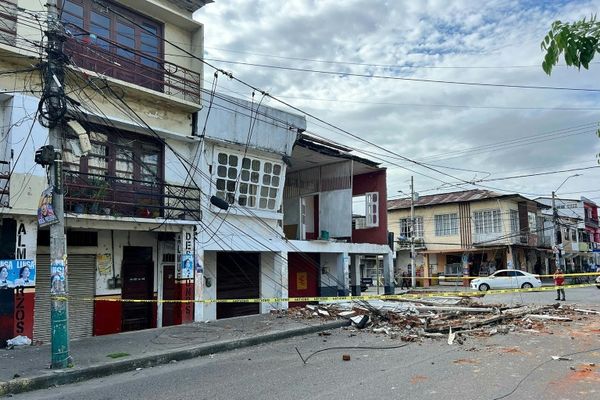Papua New Guinea is one of just four countries in the world without a single woman in parliament.
But as the country heads back to the polls, dozens of female candidates are putting their hands up to try to change that.
Among them is Delilah Gore, one of 167 women contesting PNG's elections. They represent less than 5 per cent of the total number of candidates, but it's hoped some of them will get over the line.
"Aza! Aza!" people on the roadside shout as Ms Gore drives past.
She smiles and waves through an open window.
"The word 'aza', means mother in my language," she explains.
"So, they've been calling me 'mother, mother', everywhere we go."
Ms Gore has been busy on the campaign trail, visiting as many villages as she can in her district, in the mountains near PNG's famous Kokoda Track.
"We've been having a big crowd at every village where we go," she says.
"The reception has been very good — 110 per cent in all the villages."
With polls now open in PNG's election, campaigning has ended. Ms Gore is hopeful she has done enough to get herself over the line.
She knows the task ahead if she is elected. She served as an MP in 2012, before losing the 2017 election that returned an all-male parliament.
Ms Gore believes this time, female voters could be key for many of the women contesting.
"I have seen a shift in women's way of thinking now," she says.
For the first time, women are being given separate polling lines at the election, to try to protect them from intimidation and allow them to vote freely and without influence from male family members.
"It's now very safe and free to vote, it's good that it's safe and we are happy to vote now," said one woman who was lining up as polls opened in Tari, in Hela province.
Polling will run for three weeks, so it remains to be seen how successful the lines will be across the country. There are concerns they may not be properly enforced by authorities or that women may still be watched once they get to the booth.
Voting in PNG can often be chaotic and difficult to manage, but women-only lines are still being seen as a step in the right direction.
'To be an agent of change, you've got to rise up'
On the opposite end of the country, in the Eastern Highlands, Mofa Nina Giheno is also standing for election.
"It's very rare for women in the highlands to take a front seat, especially in the political space," she says.
Ms Giheno, the daughter of a former acting prime minister John Giheno, decided to step into politics after his death in 2017.
She says her father's supporters have backed her, and she is also hoping her work in the local coffee industry and on numerous boards in the region will sway voters.
Ms Giheno received a rousing welcome at a major rally in Henganofi Station in the weeks leading up to the election. Hundreds of people gathered to cheer her on.
She has campaigned on issues affecting women across PNG, including high rates of domestic violence and maternal deaths.
"I've always had a passion for working in the rural communities and helping our women, which are the most marginalised people, especially in the highlands," she said.
"This is my opportunity to bridge that gap and be a voice for them — for the voiceless."
Since Independence in 1975, only seven women have been elected to PNG's parliament.
A number of factors have contributed to this scarcity, including cultural issues, largely patriarchal societies and a lack of women being endorsed by major parties.
"To be an agent of change, you've got to rise up," Ms Giheno says.
What happens if the election returns another all-male parliament?
In nation's capital, Port Moresby, Sylvia Pascoe is facing an uphill battle to unseat the current governor.
"One place I went somebody said to me, 'oh, my daughter, you're coming up against a giant, you're coming up against a Goliath'. And instantly another woman stood up and said, 'David only needed one stone'," she told the ABC.
But Ms Pascoe says she isn't thinking about the competition and wants to "run her own race".
A well-known local businesswoman and entrepreneur, Ms Pascoe believes there is an appetite for change.
At a rally in Port Moresby, she spoke to the gathered crowd about the difficulty she faced getting into business as a young Papua New Guinean woman and expressed her dismay at the state of health care and other services in the country.
"We're living in a city where… even in middle-class neighbourhoods, we're collecting buckets of water into the house," she said.
With the six-week campaign period over, Ms Pascoe, Ms Giheno, Ms Gore and the 160-odd other women vying for a seat are waiting to see if their efforts will be enough to break through.
Before the election, there was a plan to establish five reserved seats for women in the parliament, but the bid was shelved.
The idea has received a mixed response, including from female voters and candidates.
Many are concerned women won't be given an even footing in parliament if they're perceived to have been "given" a seat.
If PNG returns another all-male parliament this election, the idea will likely be revisited. But the women running this time around hope it won't be necessary.







